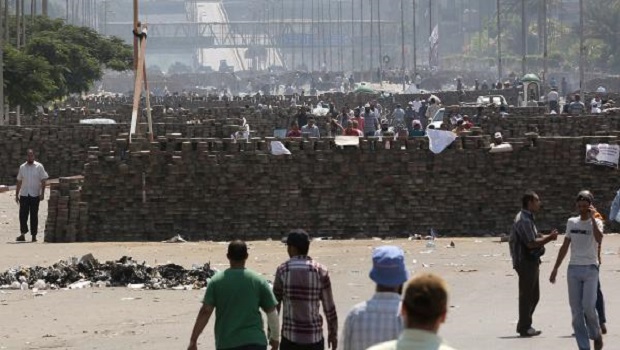
Supporters of ousted president Mohamed Mursi walk near roadblocks following clashes with police forces near the tomb of former president Anwar Al-Sadat in Cairo, Egypt on July 27, 2013. (EPA/MOHAMMED SABER)
Muslim Brotherhood spokesman Gehad El-Haddad said police used tear gas before opening fire on peaceful protesters in Cairo just before dawn on Saturday.
However, Hani Abdel-Latif, an Egyptian interior ministry spokesman, accused the supporters of the Muslim Brotherhood of instigating violence. He said: “The Muslim Brotherhood did not intend to let the day pass peacefully and tried to spoil it,” in reference to the pro-Mursi protests around Egypt.
Abdel-Latif added in a statement issued on Saturday that “Mursi’s supporters moved from Rabaa Al-Adawiya square to the October 6 Bridge near El-Nasr Road to block the road and disrupt traffic. They set fire to tires on the entrance of the bridge and clashed with residents of a nearby area.”
Abdel-Latif said firearms were used in the clashes between the residents and Mursi’s supporters, adding that the police only used tear gas. The clashes, he added, resulted in injuries to 14 police officers, two of whom were seriously wounded.
A member of the Egyptian Democratic Party, Ziyad Al-Alaimi, one of the prominent leaders of the January 25 revolution, said he was travelling on the highway El-Nasr Road and was surprised to see some 50 men who looked like Islamists, heading for the road and trying to block it, while throwing stones at passersby.
Alaimi, who is also a former member of parliament, added in his statement, which he published on his Facebook account, that “he heard the sound of gunfire and saw dozens of people running scared from the attack by Mursi’s supporters.”
Another eyewitness called Sayyid Abdel-Jalil said the security forces used teargas to stop Mursi’s supporters blocking the El-Nasr Road, before clashes erupted with the residents of Nasser area using firearms.
The Muslim Brotherhood, meanwhile, accused the police of using thugs to kill protesters. Ahmad El-Shennaoui, an eyewitness who supports Mursi, said police used tear gas heavily to clear the way for the thugs who “showered us with bullets and cartridges.”
On Wednesday, Gen. Abdel-Fattah El-Sisi called on Egyptians to go out to the streets on Friday to authorize him to confront what he called “terrorism and expected violence,” in reference to Mursi’s supporters. Mursi’s supporters responded by holding counter-protests around Egypt.
Prosecutor-General Hisham Barakat has ordered an urgent investigation into the violence, and appointed a coroner to examine the bodies of victims and listen to witnesses from both sides.
Clashes also erupted in the northern city of Alexandria. A statement by the interior ministry said “police intervened to separate supporters of Mursi and residents, in fear for public safety. Ten residents were killed in the clashes and many more were injured, including police officers. Police intervention prevented many deaths, considering the area and the number of people involved.”
On Saturday, the Strong Egypt Party condemned the killings of protesters over the last two days. The party leader, Abdel Moneim Aboul-Fotouh, a former prominent member of the Muslim Brotherhood, called for the resignation of Hazem El-Beblawi’s government because it was ‘no longer capable of protecting the people.’
A statement issued by the Strong Egypt Party said: “It seems that the authority that the security forces requested from the people was the authority to kill, not to confront terror.”
Meanwhile, international reaction has condemned the violence and called for calm. Catherine Ashton, the EU’s foreign relations chief, said she “deeply deplored the loss of life in the demonstrations” and called on all parties to stop the violence.
The British Foreign and Commonwealth Office condemned the use of violence against protesters in Egypt and called on all parties to reduce tension. Foreign Secretary William Hague expressed deep concern and said: “I call on all parties to end the violence. What is needed now is dialogue, not confrontation. The responsibility of the leadership is to take steps to reduce tension.”
US secretary of state John Kerry also condemned the violence and called on the Egyptian authorities to respect the right of peaceful protests and freedom of expression.
